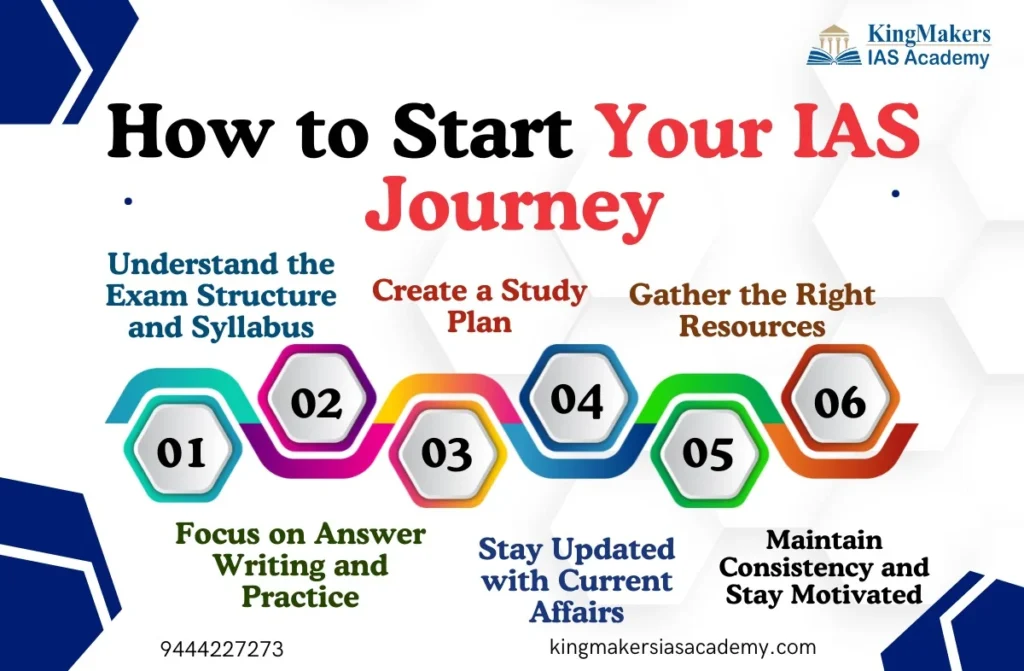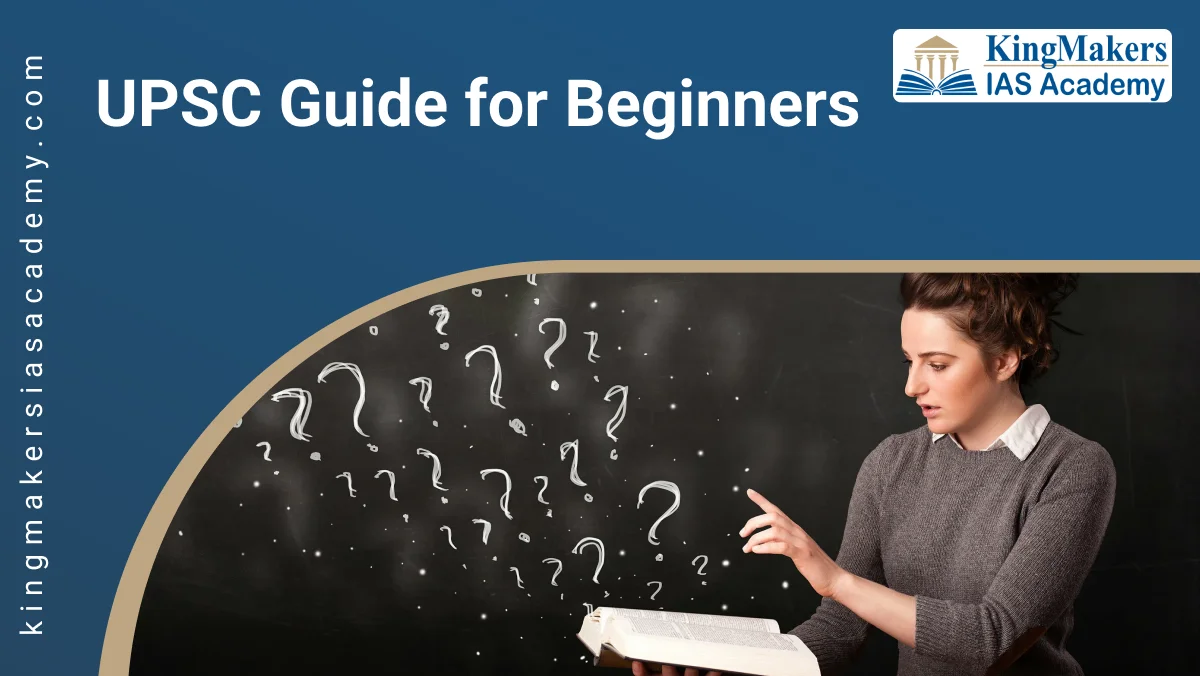In India, the UPSC (Union Public Service Commission) Civil Services Examination stands out as one of the most distinguished and rigorous examinations. Aspiring candidates dream of becoming IAS (Indian Administrative Service) officers, but the road to success can seem overwhelming. This UPSC Guide for Beginners is designed to provide a clear roadmap for starting your IAS journey, helping you navigate the initial stages of preparation with confidence and clarity.

Understanding the UPSC Civil Services Exam Structure
Before diving into the UPSC preparation guide for beginners, it is crucial to understand the exam structure. There are three components in the UPSC Civil Services Examination.
- Preliminary Examination (Prelims): This is an objective type examination with two papers – General Studies (GS) Paper I and Civil Services Aptitude Test (CSAT) Paper II. While CSAT is qualifying in nature, candidates must score above the cut-off in GS Paper I to advance to the next stage.
- Main Examination (Mains): This stage is a descriptive examination that tests candidates on various subjects. There are nine papers in total, including four General Studies papers, two optional subject papers, an essay paper, and two language papers.
- Interview (Personality Test): The final stage is the UPSC interview, where candidates are assessed on their overall personality, communication skills, leadership qualities, and knowledge of current affairs.
This UPSC Guide for Beginners emphasizes that understanding this structure is essential to building a solid preparation strategy.
Step 1: Start with the Syllabus
The UPSC syllabus is vast, and without a clear understanding of it, preparation can feel directionless. Study the official syllabus carefully. It is the foundation of your preparation, and every topic you study should be aligned with it.
- Break down the syllabus into manageable parts: Begin by categorizing the subjects into smaller portions. Focus on core subjects like History, Geography, Polity, and Economics in the initial months.
- Prioritize topics based on importance: Some areas, like Polity, are considered scoring, so prioritize them in your study plan.
As this tips for UPSC beginners suggests, mastering the syllabus is the first step to becoming an efficient and focused IAS aspirant.
Step 2: Choosing the Right Optional Subject
Choosing the appropriate optional subject for the Mains is essential. It should align with your interests and academic background, and have a good overlap with the General Studies syllabus. Subjects like Public Administration, Sociology, Geography, and Anthropology are popular choices.
When selecting your optional subject, ensure that:
- You have access to sufficient study material.
- The subject interests you enough to sustain motivation over a long period.
- It complements your overall preparation.
In this UPSC Guide for Beginners, we recommend researching optional subjects thoroughly and making an informed decision.
Step 3: Build a Strong Foundation with NCERT Books
NCERT books from Classes 6 to 12 are the backbone of UPSC preparation. They provide clear and concise information, which is essential for building a strong foundation, especially for beginners. Here is how to approach NCERTs:
- Start with history, geography, and polity books. These subjects constitute the foundation of the UPSC syllabus.
- Take detailed notes while reading NCERTs to create a strong base for advanced reference books.
This UPSC preparation guide for beginners stresses the importance of starting with these foundational books, as they simplify complex topics and make understanding easier.
Step 4: Daily Newspaper Reading for Current Affairs
Keeping up with current affairs is essential for IAS aspirants. Develop a habit of reading a reputable newspaper daily, like The Hindu or The Indian Express. Focus on important news related to:
- Government policies and schemes
- International relations
- Economic updates
- Environmental issues
Create a habit of making short notes on relevant articles and revising them regularly. Current affairs play a major role in both Prelims and Mains, and as this UPSC Guide for Beginners highlights, consistent newspaper reading will help you stay ahead.
Step 5: Practice Answer Writing from the Beginning
Answer writing is a key aspect of UPSC Mains. The ability to express your thoughts clearly, concisely, and within a limited time frame can make or break your score. Therefore, it is important to start practicing answer writing early on in your preparation.
- Join a test series: Many coaching institutes offer Mains test series, where you can get your answers evaluated by experts.
- Write daily answers: Pick a question from the syllabus and practice writing structured answers with an introduction, body, and conclusion.
This UPSC Guide for Beginners encourages aspirants to dedicate time to improving answer-writing skills, as it is a critical component of the exam.
Step 6: Time Management and Creating a Study Plan
A well-structured study plan is essential for cracking the UPSC exam. Here is how you can create an effective study plan by understanding the UPSC beginners guidance:
- Divide your time between Prelims and Mains preparation. While Prelims focuses on factual information, Mains requires an in-depth understanding of concepts.
- Allocate time for revision and mock tests. Regular revision is crucial for retaining information, and mock tests help simulate the exam environment.
- Set daily, weekly, and monthly goals. Monitor your progress consistently and modify your study plan as required.
Effective time management is often the difference between success and failure, and this UPSC Guide for Beginners emphasizes the importance of planning and adhering to a disciplined routine.
Step 7: Mock Tests and Prelims Practice
Mock tests are invaluable in assessing your preparation level. They assist you in recognizing your strengths and weaknesses while enhancing your time management abilities.
- Participate in regular mock tests for both the Prelims and Mains.
- Analyze your performance after each test to understand areas of improvement.
This UPSC Guide for Beginners suggests taking as many mock tests as possible to get accustomed to the exam pattern and improve your accuracy and speed.
Step 8: Developing the Right Mindset and Staying Motivated
Preparing for the UPSC is a long-term commitment, not a quick race. It demands determination, discipline, and a constructive attitude. Surround yourself with supportive friends or family members who understand the challenges you are facing.
- Take regular breaks to avoid burnout.
- Stay physically and mentally fit by incorporating exercise and meditation into your daily routine.
The journey can be long and challenging, but this UPSC beginners guidance reminds you that success comes to those who are patient and persistent.
Step 9: The Role of Coaching – To Join or Not?
Coaching can be helpful, especially for beginners, but it is not mandatory. Many candidates clear UPSC without formal coaching by relying on self-study and online resources.
If you decide to join coaching, ensure that:
- It provides quality study material and test series.
- The teaching style suits your learning preferences.
For those following this UPSC Guide for Beginners, the decision to join coaching should be based on personal needs, financial considerations, and available time.
Step 10: Stay Updated with Online Resources and Study Groups
Online platforms like YouTube, dedicated UPSC preparation websites, and educational apps offer plenty of resources, including lectures, current affairs summaries, and test series.
- Join online forums and study groups to interact with fellow aspirants, share notes, and clear doubts.
- Follow reputable blogs and websites that provide regular updates and strategies for UPSC preparation.
As this tips for UPSC beginners advises, leveraging online resources can help you stay updated and broaden your knowledge base.
Conclusion
To conclude, beginning your IAS journey may feel overwhelming, but with the right strategy, discipline, and expert guidance from KingMakers IAS Academy, it becomes entirely attainable. This UPSC Guide for Beginners provides a clear pathway to embark on your preparation. Remember that consistent effort, a focused strategy, and a positive attitude are your greatest tools. Start early, stay motivated, and success will follow!
Check Out: Best IAS Coaching Center in India.


